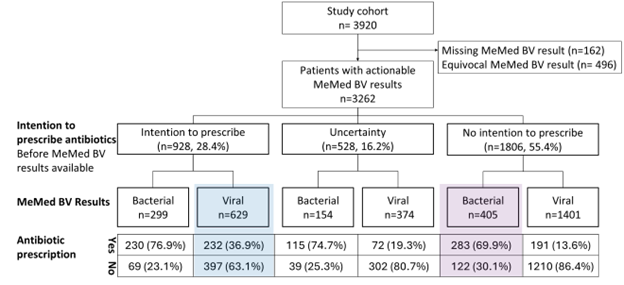Antibiotic misuse is a major driver of antimicrobial resistance, a global public health threat. Determining whether a patient needs an antibiotic can be challenging for clinicians—especially in the Emergency Department (ED) and in Urgent Care Centers. Fortunately, the host response to bacterial infection differs from the response to viral infection. Leveraging the host immune response, MeMed® created an FDA-cleared test designed to aid physicians in differentiating between bacterial and viral infections. MeMed BV® calculates a score based on computational integration of the blood levels of three host proteins: TRAIL, IP-10 and CRP.
In this study, performed across 10 urgent care centers in Israel, the intent to prescribe antibiotics was compared before and after receiving MeMed BV results. Physicians reported whether the MeMed BV results influenced patient management and patient referral to the ED.

Fig. 1 Patient flow, intention to prescribe antibiotics, the MeMed BV results and final prescription practice decision
The study found:
- MeMed BV influenced physicians' ED referral decisions for 24% of patients (700/2901). Of them 85% avoided ED visit
- When there was an intention to prescribe antibiotics but MeMed BV flagged the infection as viral, physicians adhered to the MeMed BV results in 397/629 (63.1%) of cases, avoiding potentially unwarranted antibiotics
- When there was no intention to prescribe antibiotics but MeMed BV flagged the infection as bacterial, physicians prescribed antibiotics to 283/405 (69.9%) of cases that otherwise could have been missed
- Adherence to MeMed BV was associated with fewer hospitalizations in 7-day follow up (7.8% vs. 30.3%, p<0.01)
- MeMed BV aided in patient management decisions for 86% of cases, either changing (24%) or supporting (62%) the decision-making process.
 English
English

